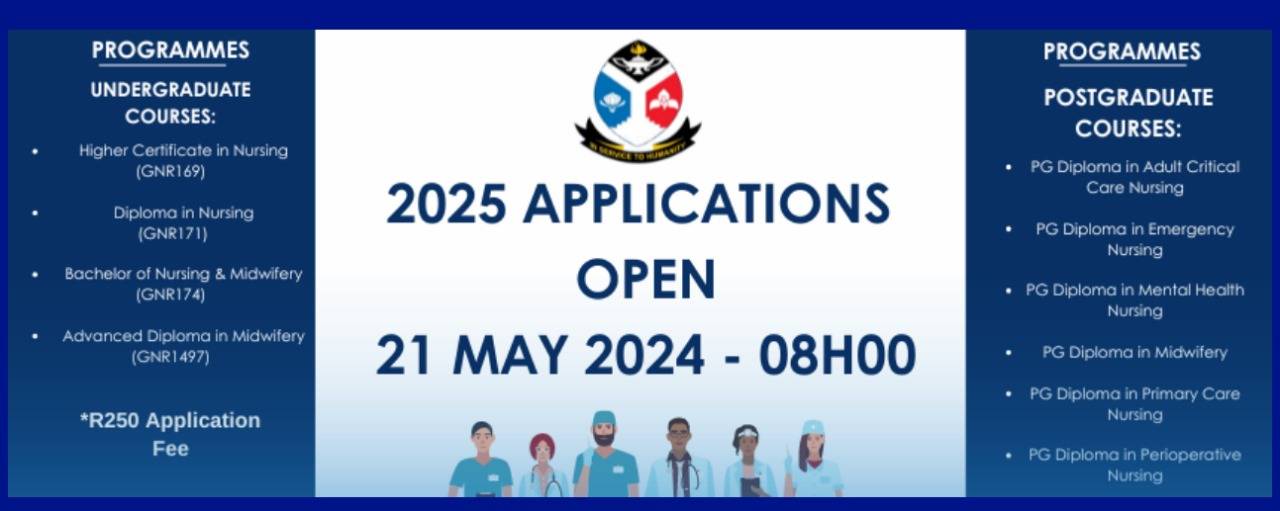Higher Certificate in Auxiliary Nursing 2024
Purpose
The qualification serves to provide learners with the basic knowledge, affective,
cognitive and conceptual tools and practical techniques for additional higher
education studies in nursing. The knowledge emphasizes general principles and their
application in the provision of basic nursing care. This qualification signifies that the
learner has attained a basic level of higher education knowledge and competence in
nursing and is capable of applying such knowledge and competence in the workplace.
The qualification aims to:
Produce nurses that will provide basic nursing care in all spheres of health
care service delivery
Provide the nurse with a wide range of cognitive, affective and psychomotor
skills
Hone skills in assessment, planning and implementation basic nursing care
Develop writing and oral communication skills
Attributes
The nurse who completes this qualification will be able to:
Apply knowledge of theory and practice of basic nursing care
Assess, plan, implement and evaluate basic nursing care for individuals and
groups throughout the life span
Demonstrate professionalism when rendering basic nursing care
Rationale
A first level nurse, capable of delivering skilled basic nursing care, is essential to
health care in a variety of settings. Combining nursing care with prevention and
promotion makes this nurse a strong primary health care worker. The competence of
this first level nurse will be in line with the recommendation of the Pick Report nurse
training to be expanded to include essential skills needed in the community.
This person works under the supervision of a nurse with a National Diploma or
Degree in Nursing within the applicable scope of practice.
The rationale is to provide independently in a variety of health care settings within
the relevant legal and ethical parameters.
ADMISSION REQUIREMENTS
Access to this qualification is National Senior Certificate or an equivalent
qualification at exit level 4
LEARNING ASSUMED TO BE IN PLACE
Communication Level 4
Mathematical literacy Level 4
Life Sciences Level 4
Computer Literacy Level 3
QUALIFICATION REQUIREMENTS:
In terms of current relevant legislation:
The Nursing Education Institution (NEI) is required to register learners with the
South African Nursing as for the duration of the period of training
The NEI can only offer programmes and accept students for approved and
accredited qualification
Learners must have access to approved clinical facilities according to training
regulations issued by SANC that has a Memorandum of Agreement in place.
QUALIFICATION RULES
TOTAL Credits: 120 of which 72 credits must be acquired in appropriate and
accredited clinical facilities and 70% of clinical acquired credits must be
supervised and mentored.
ARTICULATION OPTIONS
The Higher Certificate in Auxiliary Nursing, articulates with the National
An auxiliary nurse is a nursing assistant that helps doctors, nurses and other medical professionals in caring for the sick.
To become an auxiliary nurse, you’ll need to understand the cost involved, find and enrol in the right programme and meet all of the necessary requirements.
This guide will provide you with all the information you need to start your nursing journey.
Understand The Requirements For Becoming An Auxiliary Nurse In South Africa
Before you can become a qualified auxiliary nurse in South Africa, you must understand and meet the necessary requirements needed to succeed in this profession.
These include completing an approved programme or course at a higher educational institution, passing a relevant nursing board examination and completing a period of supervised practice. You may also need to achieve additional requirements in terms of age, language proficiency and criminal background checks.
Assess The Costs Associated With An Auxiliary Nursing Programme In South Africa
Once you have found an auxiliary nursing programme that is approved by the South African Nursing Council, you’ll need to consider the additional costs, such as application fees, tuition fees, learning materials and transport costs. It could be beneficial to explore the various financing options available in order to ensure that you can afford the programme you have chosen.
There may be available scholarships from government programmes or universities. Ensure that you meet the necessary academic and financial requirements before applying for funding. The cost of completing an auxiliary nursing course in South Africa vary depending on the institution, so be sure to check to the fees at the different colleges or universities you are applying to.
Here are some bursary options to explore:
- Gauteng College of Nursing Bursary
- Western Cape Government Health Bursary
- Department of Health Nursing Bursary
- KwaZulu Natal Government Health Bursary
Learn Which Schools Are Recommended For Auxiliary Nursing Programmes
When choosing an auxiliary nursing programme, it would be best to find one that is recommended by the South African Nursing Council.
Some of the recommended institutions include Rhodes University, The University of Cape Town and the University of the Free State. These accredited universities offer a wide range of courses that will prepare you to become a successful auxiliary nurse in South Africa.
Obtain The Necessary Certifications To Become An Auxiliary Nurse In South Africa
To become an auxiliary nurse in South Africa, you will need to obtain certain certifications. You will need to be certified by the Nursing Council of South Africa and have knowledge of and experience in patient care, first aid, early detection of diseases and disorders, medication management, administration of observations such as temperature, pulse and respiration rate, among many other important skills.
All of these skills and certifications are essential to become a successful auxiliary nurse in South Africa.
Be sure to do all the necessary research before deciding on the correct programme for you and pay special attention to the tuition fees as well as all the additional costs you may encounter.
Diploma in Nursing
